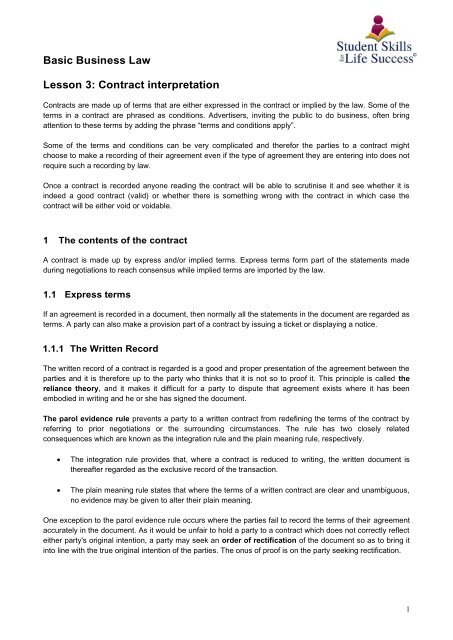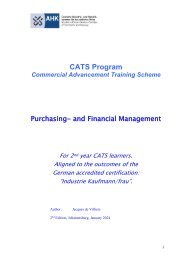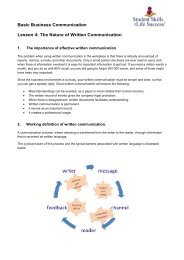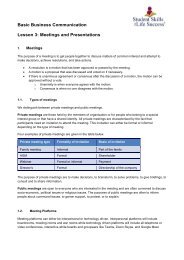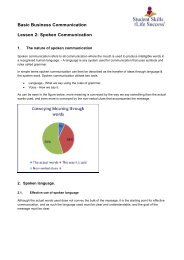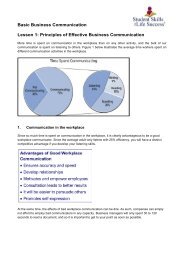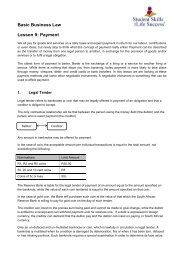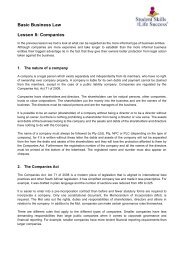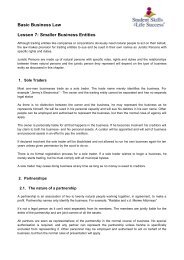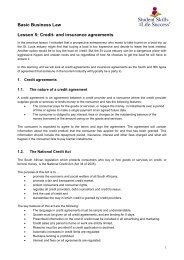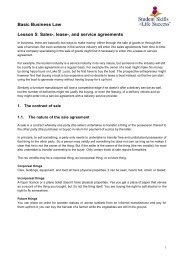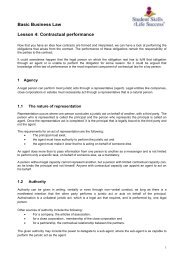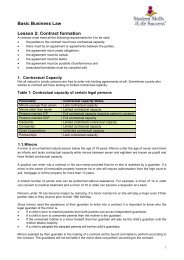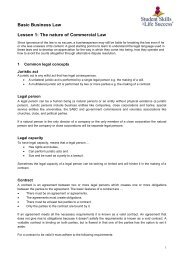Basic Business Law. Lesson 3. Contract Interpretation
This is the third lesson of the "Student Skills for Life Success" "Basic Business Law" course. The topics covered in this booklet are: 1. The contents of the contract 2. Voidable contract 3. Available remedies
This is the third lesson of the "Student Skills for Life Success" "Basic Business Law" course. The topics covered in this booklet are:
1. The contents of the contract
2. Voidable contract
3. Available remedies
Create successful ePaper yourself
Turn your PDF publications into a flip-book with our unique Google optimized e-Paper software.
<strong>Basic</strong> <strong>Business</strong> <strong>Law</strong><br />
<strong>Lesson</strong> 3: <strong>Contract</strong> interpretation<br />
<strong>Contract</strong>s are made up of terms that are either expressed in the contract or implied by the law. Some of the<br />
terms in a contract are phrased as conditions. Advertisers, inviting the public to do business, often bring<br />
attention to these terms by adding the phrase “terms and conditions apply”.<br />
Some of the terms and conditions can be very complicated and therefor the parties to a contract might<br />
choose to make a recording of their agreement even if the type of agreement they are entering into does not<br />
require such a recording by law.<br />
Once a contract is recorded anyone reading the contract will be able to scrutinise it and see whether it is<br />
indeed a good contract (valid) or whether there is something wrong with the contract in which case the<br />
contract will be either void or voidable.<br />
1 The contents of the contract<br />
A contract is made up by express and/or implied terms. Express terms form part of the statements made<br />
during negotiations to reach consensus while implied terms are imported by the law.<br />
1.1 Express terms<br />
If an agreement is recorded in a document, then normally all the statements in the document are regarded as<br />
terms. A party can also make a provision part of a contract by issuing a ticket or displaying a notice.<br />
1.1.1 The Written Record<br />
The written record of a contract is regarded is a good and proper presentation of the agreement between the<br />
parties and it is therefore up to the party who thinks that it is not so to proof it. This principle is called the<br />
reliance theory, and it makes it difficult for a party to dispute that agreement exists where it has been<br />
embodied in writing and he or she has signed the document.<br />
The parol evidence rule prevents a party to a written contract from redefining the terms of the contract by<br />
referring to prior negotiations or the surrounding circumstances. The rule has two closely related<br />
consequences which are known as the integration rule and the plain meaning rule, respectively.<br />
• The integration rule provides that, where a contract is reduced to writing, the written document is<br />
thereafter regarded as the exclusive record of the transaction.<br />
• The plain meaning rule states that where the terms of a written contract are clear and unambiguous,<br />
no evidence may be given to alter their plain meaning.<br />
One exception to the parol evidence rule occurs where the parties fail to record the terms of their agreement<br />
accurately in the document. As it would be unfair to hold a party to a contract which does not correctly reflect<br />
either party's original intention, a party may seek an order of rectification of the document so as to bring it<br />
into line with the true original intention of the parties. The onus of proof is on the party seeking rectification.<br />
1
1.1.2 Tickets<br />
Typically a supplier of goods or services will issue the customer with a document<br />
setting out certain provisions which the supplier wishes to incorporate in the contract. – Often an exemption<br />
clause. One way of introducing these terms is thru the issuing of a ticket.<br />
The law holds that, even if the customer was unaware that there was writing on the ticket he will be bound by<br />
the contract incorporating the terms in question, provided the supplier did what was reasonably necessary to<br />
bring the terms to his attention.<br />
The following provisions apply:<br />
• The ticket must be handed over before the agreement is concluded.<br />
• The ticket must be a document in which a reasonable person would expect to find terms. For example,<br />
terms would be expected as part of a quotation, but not as part of an invoice, or an account statement.<br />
• The writing must be prominent//clear.<br />
• The customer must be given an opportunity to examine the ticket.<br />
1.1.3 Notices<br />
Instead of issuing a ticket, a supplier can exhibit, at the place where the contract with the customer is<br />
concluded, a notice setting out one or more provisions which he wishes to include in the contract.<br />
The law holds that even if the customer did not see the notice or, if he did not read it, he will be bound by the<br />
provisions in question, provided the supplier did what was reasonably required to bring them to the notice of<br />
the customer.<br />
As in the case of tickets, some provisions apply:<br />
• Notification must be contemporaneous (at the same time) with contract formation<br />
• The notice must be conspicuous (on show)<br />
• The writing must be prominent<br />
• The provisions must be noticeable<br />
• The customer must be given an opportunity to read the notice<br />
Nothing prohibits a supplier from both displaying a notice and issuing a ticket containing terms.<br />
1.2 Implied terms<br />
1.2.1 Tacit terms<br />
These are terms that exist to give effect to the parties' common intention. A court will not lightly intervene to<br />
remedy a deficiency in a contract, but if the suggested term is necessary to give effect to the common<br />
intention of the parties it will be read into the contract, even if the parties did not actually think of the term or a<br />
situation in which it would come into operation.<br />
The court usually applies the curious bystander test to determine the intention of the parties. This test poses<br />
the question: what would the parties have said if, at the time of contracting, a bystander had asked; 'what will<br />
happen in such a case'?<br />
The test requires that, when asked about it, they should immediately and unanimously agree on the term to<br />
govern it.<br />
The court cannot imply a term in the following cases:<br />
2
• Where provision for a hypothetical situation was made and the suggested<br />
term would conflict with the express provision,<br />
• where the required term is not capable of clear and exact formulation,<br />
• where either of the parties would have wanted to consider/discuss the matter further or<br />
• where the parties would have expressed different views on what the outcome of the hypothetical<br />
situation would be.<br />
1.2.2 Terms implied on the basis of a trade usage<br />
A recognised trade usage will be incorporated in a contract as a term thereof, irrespective of whether the<br />
parties knew of the usage or not.<br />
The requirements are the following.<br />
• The usage must be certain.<br />
• It must be reasonable and not contrary to the law.<br />
• It must be generally known, and universally and uniformly adhered to, within the particular trade or<br />
branch of commerce concerned.<br />
• It must be consistent with the other provisions of the contract.<br />
Example<br />
Havoc breaks out at the fresh produce market when the new assistant, Jimmy Rules, refuses to give<br />
greengrocer, Jack First, a free sampler box of grapes. Jack had been coming to the same market for ten<br />
years and he has always received a free sampler box if he ordered 15 boxes or more of any fruit.<br />
Jimmy Rule is clearly not aware of the “free sampler box” rule at the market, but as this unwritten rule has<br />
been in place for a long time and if all the other requirements as set out above is met, he will be obliged to<br />
give Jack a free sampler box of everything he ordered more than 15 boxes of.<br />
1.2.3 Common-law rules<br />
There are common-law rules concerning co-parties. Where two or more parties agree to render a<br />
performance, the common law will determine the extent of each party’s liability in the absence of an<br />
agreement. The same applies to the rights of co-creditors.<br />
Other common law rules govern performance and these will be used to determine what a party must do to<br />
discharge his contractual liability where it is not made clear by the contract itself.<br />
Some special contracts are also governed by common law rules. For example sale- and lease agreements<br />
have a set of terms which are known as the naturalia of that particular category of contract.<br />
Example<br />
Peter Onions, a new greengrocer in town goes to the local market to buy fruit and vegetables. He arrives at<br />
06:10 and finds that there are already ten other greengrocers waiting in line for their trucks to be loaded. As<br />
he pulls up, a gap opens up in the line and he moves into the gap. This greatly upsets the men behind him,<br />
who accuses him of rudeness and calls him names that cannot be reproduced in a textbook.<br />
There is a common law concept that you must wait in line for your turn. This rule is not written down<br />
anywhere, but we all adhere to it. So if some of the men behind Peter don’t get the products they came for<br />
because of Peter’s action, they would have a claim for delictual damages against him.<br />
3
1.2.4 Statutory terms<br />
Legislation determines the content of - and the legal positions of the parties to some contracts. It is assumed<br />
that the parties to the contract have knowledge of all such legislation.<br />
1.3 Conditions<br />
A condition is a provision (term) which qualifies an obligation arising from the contract by making its<br />
enforceability dependent upon some uncertain future event. There are two types of conditions, namely<br />
suspensive conditions and resolutive conditions.<br />
1.<strong>3.</strong>1 Suspensive condition<br />
A suspensive condition suspends the operation of an obligation arising from the contract until the<br />
occurrence, or non-occurrence, of a future uncertain event.<br />
Prior to fulfilment of the condition, the conditional debtor is not liable to perform the suspended obligation, but<br />
the parties are contractually bound to each other and each must carry out the obligations which are not<br />
affected by the condition.<br />
Example<br />
Billy buys Sandy’s house on condition that he is able to raise a building society loan or to sell his own house.<br />
They agree that Billy will take immediate occupation of the property and pay a certain amount each month as<br />
'occupational rental'.<br />
Prior to his obtaining the loan or selling his house, Billy is not required to pay the purchase price to Sandy,<br />
but he can insist that Sandy give him occupation of the property and can be made to pay the occupational<br />
rental.<br />
Where a suspensive condition is fulfilled, the debtor must perform the obligation which was suspended.<br />
Where a suspensive condition fails, the suspended obligation comes to an end and obligations which were<br />
not affected by the condition also terminate if the agreement so provides, or if they were agreed to in<br />
contemplation of the condition being fulfilled.<br />
Example<br />
The building society loan is granted to Billy.<br />
The suspensive condition is fulfilled, and he will be obliged to pay the purchase price to Sandy.<br />
OR<br />
Billy fails to obtain the loan.<br />
The agreement becomes void as the suspensive condition was not met and Sandy can accept other offers<br />
for the house. As the occupational rent agreement came into operation in contemplation that the conditions<br />
would be met, that agreement also comes to an end and Bill must return the property back to Sandy in the<br />
condition that he found it'.<br />
If no time for the occurrence (or non-occurrence) of the event has been agreed upon, expressly or impliedly,<br />
the law holds that the condition fails if the event does not take place within a reasonable time. Important<br />
factors to consider in determining whether a reasonable time has elapsed are difficulties, obstacles, delays<br />
and the commercial interests of the parties.<br />
4
1.<strong>3.</strong>2 Resolutive condition<br />
While an obligation or contract subject to a suspensive condition cannot be enforced until fulfilment of the<br />
condition, an obligation or contract subject to a resolutive condition is immediately enforceable; but the effect<br />
of the condition is that the continued operation of the obligation or contract is dependent upon the<br />
occurrence or non-occurrence, of a future uncertain event.<br />
Until the condition is fulfilled, both parties must carry out their respective performances. If the condition is not<br />
fulfilled, the contract is regarded as if it were unconditional from the outset. If the condition is fulfilled, the<br />
obligation or contract becomes null and void retrospectively and the parties must be restored to their original<br />
positions.<br />
Example<br />
Carl sells his house to Bennie and the contract provides that the entire transaction will lapse if Carl receives<br />
a higher offer within a stipulated period.<br />
Prior to receipt of the offer, both parties must perform under the contract. If no higher offer is received, the<br />
condition is treated as if it never existed. If a higher offer is received, the sale becomes void, and each party<br />
must return to the other whatever was received in terms of the contract.<br />
2 Voidable contracts<br />
In our law the presence of certain elements will render a contract either void or voidable. If a contact is void it<br />
will be invalid from the outset and no obligations will be created. A voidable contract on the other hand will<br />
remain valid and binding until the innocent party chooses to rescind from it.<br />
Table 1: Void and voidable contracts<br />
Element<br />
Vagueness<br />
Uncertainty<br />
Illegality<br />
Impossibility of Performance<br />
Non-observance of Prescribed Formalities<br />
Misrepresentation<br />
Duress<br />
Undue influence<br />
Companies contracting outside their scope of business<br />
Result<br />
Always void<br />
Always void<br />
Always void<br />
Always void<br />
Usually void<br />
Voidable<br />
Voidable<br />
Voidable<br />
Voidable<br />
It is clear from the table that if the requirements of certainty, lawfulness and possibility of performance are<br />
not met, then the agreement will be invalid from the outset and no obligation will be created. The<br />
requirements for the formation of a valid contract were discussed in the previous learning unit.<br />
The situation is different in the case of voidable contracts. Here obligations are created but the afflicted party<br />
will have an option to perform those obligations or not.<br />
Where a party to a contract was induced to give his assent by misrepresentation, duress or undue influence<br />
such a party may be permitted to rescind from the contract. Such a party could also claim delictual damages<br />
and restitution.<br />
5
2.1 Misrepresentation<br />
The innocent party will be allowed to rescind from the contract if he can prove that the other party induced<br />
the contract by intentionally making a representation with regard to a material fact that was either false or he<br />
didn’t disclose such a material fact. For example, whether or not a car was previously involved in an accident<br />
is a material fact and a salesman who lies about it or keeps the information from a seller, will be guilty of<br />
misrepresentation<br />
The misrepresentation can be verbal, non-verbal or a combination of words and actions.<br />
Where somebody expresses an opinion that he doesn’t really believe or he doesn’t really have facts to back<br />
up his opinion he can also be guilty of misrepresentation.<br />
A party to a contract is not generally expected to reveal all information available to him, but there are cases<br />
where he is under a duty to speak and if he doesn’t, he will be guilty of misrepresentation as in the following<br />
cases:<br />
• Where he has told a half truth that could be misleading<br />
• Where a statement is no longer correct because of changed circumstances<br />
• Where he has taken steps to prevent the other party from finding out the truth<br />
• Where the proposed contract requires a relationship of truth and confidence<br />
• Where the other party is dependent on him as a source of information<br />
The law accepts that persons who are eager to sell their goods, or let their services will habitually use<br />
exaggerated language to describe their wares or service. This practice is known as puffing and is not<br />
actionable as misrepresentation.<br />
Example<br />
Salesman Vusi tells Tshepo that the car he is looking at, is the best car on their catalogue and that he must<br />
move fast or someone else is likely to snap up the vehicle. - This is puffing: Tshepo will know that Vusi is<br />
expressing a subjective opinion on car.<br />
Salesman Vusi tells Tshepo that the car he is looking at has the best fuel economy on the market knowing<br />
that this is not the case. - This is misrepresentation: Fuel economy can be objectively ascertained and if<br />
Tsepo believes what Vusi is telling him, he could end up buying a car he wouldn’t have, if he knew the truth.<br />
2.2 Duress<br />
Rescission will also be allowed where a contract was induced through an unlawful threat of imminent or<br />
inevitable harm as long as the innocent party’s fear was reasonable.<br />
Example<br />
Patrick Prospector believes that there is gold on the farm of Farmer Brown. He offers Farmer R2M for the<br />
farm, which is worth about R1.5M, but Farmer refuses to sell, so Patrick puts a gun to his head and forces<br />
him to sign the contract.<br />
If gold is discovered on the farm Farmer will be able to rescind the contract and he will be entitled to the<br />
benefits of the find. If however no gold is discovered, Farmer could choose not to rescind the contract and<br />
Patrick will be obliged to pay him the full purchase price of R2M.<br />
6
2.3 Undue Influence<br />
The third instance where rescission will be allowed is where a contract was induced through the<br />
unscrupulous exercising of an influence over the innocent party which weakened his powers of resistance.<br />
For example, a sangoma convinces someone in the community that selling to him an article at a fraction of<br />
its market value will bring the seller “good luck”.<br />
3 The remedies available to the innocent party<br />
The party to a contract whose assent was obtained by misrepresentation, duress or undue influence has the<br />
remedies of rescission, restitution and delictual damages available to him or her.<br />
<strong>3.</strong>1 Rescission<br />
The party who was induced into contracting through misrepresentation, duress or undue influence can elect<br />
to rescind the contract or abide by it. - If he chooses to rescind, he has to communicate his decision to the<br />
guilty party. Rescission terminates the contract and the parties are relieved of their obligations.<br />
<strong>3.</strong>2 Restitution<br />
The innocent party is entitled to obtain restitution of performance, but he also has to return what he received<br />
under the contract if it is possible and reasonable to do so. - If the innocent party decides to abide by the<br />
contract, his right of rescission is waived.<br />
<strong>3.</strong>3 Delictual Damages<br />
The innocent party can claim damages for any loss suffered as a result of entering into the contract or<br />
accepting less advantages terms, whether he decides to rescind from the contract or uphold it. - The claim<br />
will be against the person who committed the wrongful conduct, whether that person is a party to the contract<br />
or not.<br />
7


